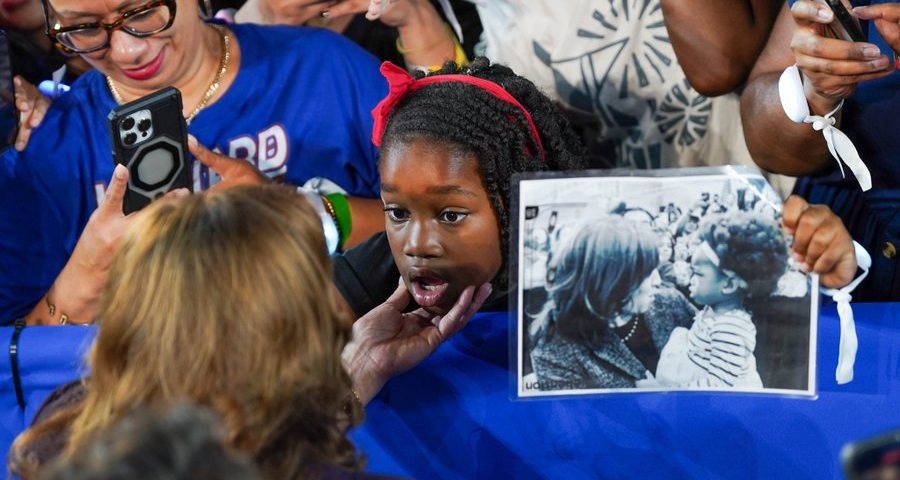
Nurture: An Equity-Centered Leadership Approach
September 11, 2024
A Refining Resilience
January 18, 2025The Equity Mirror: What a Woman Leading the Free World Could Mean for Us All

When Sojourner Truth took to the stage in Akron, Ohio, and declared to the crowd, “Ain’t I a woman,” in 1851, did she imagine a time when a woman would be the most powerful person in the world? What would she say to that? Would she advise us to wield power with grace and nurture society like only a woman could? Would she caution against ego laden leadership that is often co-opted by power? Or would she admonish us to establish the world with equity and uphold a banner of justice that mothers the world to health? When Anna Julia Cooper stood on flat shoes, yet still immensely tall, and uttered, “When and where I enter, in the quiet, undisputed dignity of my womanhood, without violence and suing or special patronage then and there the whole Negro race enters with me,” was she considering that a Black woman could lead the most powerful country in the world?
Their battles laid the groundwork for Black women and women of color to push toward a space of equity. In this new world that I doubt Anna or Sojourner would have been able to imagine, we have an equity mirror. The election of the first Black and woman president makes us believe it is possible for people with disabilities, different sexual orientations or religious beliefs to also lead the world’s most powerful nation. This is a challenge to systems of power. That is for a leader to reflect none of the values power deems necessary to lead particularly as the president of the United States.
Examining the recent tradition of women’s leadership in global governance, we will not only be able to challenge inequity, but demonstrate that communities with women leaders excel. And perhaps there is an opportunity a catalyst even to create policies that reverberate kindness and encourage equity in a new way.
Women Running the World
Rwanda, leads the world at 61.3% with Cuba at 56% of women in leadership positions. The United States is 66th, with only 35% of women serving in leadership in local government. In 2011, I was one of them. I served on my local city council for four years, and during that time, I established a youth council, served on the finance committee, helped the city avoid receivership, and ensured it maintained a healthy fund balance. We were one of the only minority-led, predominately Black city governments in Michigan without an emergency financial manager when cities like Flint and Detroit entered receivership. Those four years on the city council are often reflected on as one of the best governing bodies in recent memory.
Women’s leadership is critical to the success of governing bodies. In June 2024, there were 15 heads of government. Women hold the highest positions of power in nations such as France, Iceland, Italy, Bangladesh, and until recently, New Zealand. Jacinda Arden, the former Prime Minister of New Zealand, was internationally recognized for her Go Hard, Go Early strategy, which saved countless lives during the COVID-19 pandemic. In stark contrast, New Zealand saw 25 COVID-related deaths, whereas the U.S. saw 350,000 between March and December. Additionally, Arden instituted a wellbeing budget in 2019, a clear example of a holistic policy approach. This initiative considered quality of life metrics such as mental health, child poverty, environmental sustainability, and social inequality over inflation and GDP. Germany’s Angela Merkel is equally credited with stabilizing her country’s economy after the 2008 financial crisis with a focus on fiscal discipline. She, too, managed the COVID-19 pandemic well and introduced social policies that improved gender equity and healthcare reform. Quality of life is a central metric for global governance under women-led nations. These women have given the United States an example on how to safeguard human needs over the human ego. However, the first Black woman president may experience more significant challenges because of the systems of power in which her identity is undermined.
A Black Woman’s Leadership
Whether we know it or not, everything we think about power and leadership will now be challenged —opening an opportunity to overthrow all forms of inequality. Time will tell whether Kamala Harris turns out to be one of the best presidents we’ve experienced; regardless, all eyes will be on the choices she makes. I’m hopeful that her intentions around an opportunity economy and reproductive rights take root during her term. Like Obama’s presidency, there is something to be said for the hope that precedes such a historical appointment.
With hope in mind, let’s reconsider the hegemonic view of leadership, which is that good leaders are male, white, and have access to wealth. I want to frame leadership in terms of nurture and suggesting that prescribed ideals of womanhood also suggest a different type of leadership. I challenge those who would claim we shouldn’t equate woman’s leadership to the attributes of gender-prescribed feminine norms. To that, I say: Femininity is leadership.
This is the equity mirror — a reflection of power that doesn’t resemble what this country has seen in the last two centuries as strong and powerful leadership. We will now see a woman lead with the authority and power only 46 men before her have wielded. How can that not also hold more space for women to assume more leadership roles in their communities, homes, and board rooms. Even more so, can we also see a variety of diverse leadership based on an array of social identities.
Black women, in particular, navigate society as leaders despite the social contract’s exclusion on race and gender. This philosophical concept explores how society legitimized government as individuals agree to form a society in exchange for certain protections that overall benefit living in a community. Early philosophers like Thomas Hobbes, John Locke, and Jean-Jacques Rousseau — white men — introduced this concept. In turn, they facilitated thoughts that primarily benefited the perspective of their race and gender. Later philosophers noted that a social contract had limitations for women. We could only participate through patriarchal connections and sexual transactions like marriage, Carol Pateman wrote in her 1988 book “The Sexual Contract”. Further, in “The Racial Contract” by Charles Mills, he upends the social contract by settling the notion that white supremacy as a social-political system limited participation for Black men.
Black women were excluded. We couldn’t participate because we were women and because we were Black. In the words of Ntozake Shange, “Being COLORED and a WOMAN is a metaphysical dilemma I have not been able to conquer yet.” Nevertheless, Black women still make magic happen – 44,000 Black women hopped on a Zoom call just hours before Kamala Harris was named the presumed Democratic nominee. Their efforts sparked several other calls like Win With White Women and With Black Men. I likened this agency to gendered double consciousness, a twist on Du Bois’s earlier concept with insight to a woman’s experience. Essentially, Black women can create self-agency despite the systemic barriers in society. We often do so for others more than ourselves, triggering a somewhat exciting convergence.
What we saw this election cycle is not new. Mary Church Terrell argued that Black women had to do more and that “we must go out into the nation and change it.” The numbers speak for themselves: Black women continue to uphold democracy at the ballot box, with 91% voting for Biden in 2020 and 94% voting for Clinton in 2016.
It is for this reason, with consideration to social contract theory, that the first Black and female president challenges the concepts of inequity, and my hope is that it is challenged not solely around inequity around race or gender but in all forms. Her existence is an equity mirror, and when we glance at this new idea of power, it can challenge patriarchy and racism as the dominant social structure in society.
To be clear, I recognize that gender and race can be subject to the cultural domination of white supremacy. Actors in that system can be of any race or gender. However, I believe that Vice President Harris, as a woman leader, would lean in the way other woman leaders have demonstrated with human-centered resounding policies.
Nurturing the Country
I recommend that the woman-led United States consider creating policy from a holistic perspective. How can we view the economy, education, and our environment in a way that puts people first, with consideration for uplifting the very least of us? All of these factors intersect, and how do we build governing laws that consider the entire human being—our emotions, our psyche, our bodies, and our ability to live abundant lives?
We could build an educational system that allows our children to live and compete globally, ultimately safeguarding our strength as a country. Enacting justice for the land that we live on must be a priority, and doing so includes cutting our carbon footprint and making access to safer uses of energy available to all people. A holistic policy perspective ensures all people have what they need to thrive. Is it possible to do so and equip people with access to safe housing, a robust and rigorous education, safe and clean drinking water, and healthy food? Can we provide people with access to lead joy-filled lives? This speaks to the ability to nurture the country; a great division has occurred, and now what better time for nurture. To bring us together in a spirit of joy and contend that people deserve to live and pursue their happiness. Can we now, in the words of Sojourner Truth, gather the women, be led by a woman, and turn the world back upright again?



